The woman who would be king: Viola Davis on embracing her warrior spirit for The Woman King
- Oops!Something went wrong.Please try again later.
- Oops!Something went wrong.Please try again later.
- Oops!Something went wrong.Please try again later.
- Oops!Something went wrong.Please try again later.
The Woman King forged Viola Davis into a warrior — not just onscreen as the formidable general Nanisca, but in the years-long process of getting the tale of the Agojie, the all-female army who protected the West African kingdom of Dahomey for more than 200 years, to the screen.
"Every part of it was divine and magical," Davis tells EW of filming the historical epic. "You have to understand that when you're fighting for a film to get made, there are moments on the journey that you really go to a dark place within yourself and say, 'It's not going to happen. It's just not going to happen. I dreamed the biggest dream and it's not going to happen.'
"And then it does. And you're on that set and you're in the Motherland and you're looking at all these extraordinary actors and you are just loving them, enjoying them."
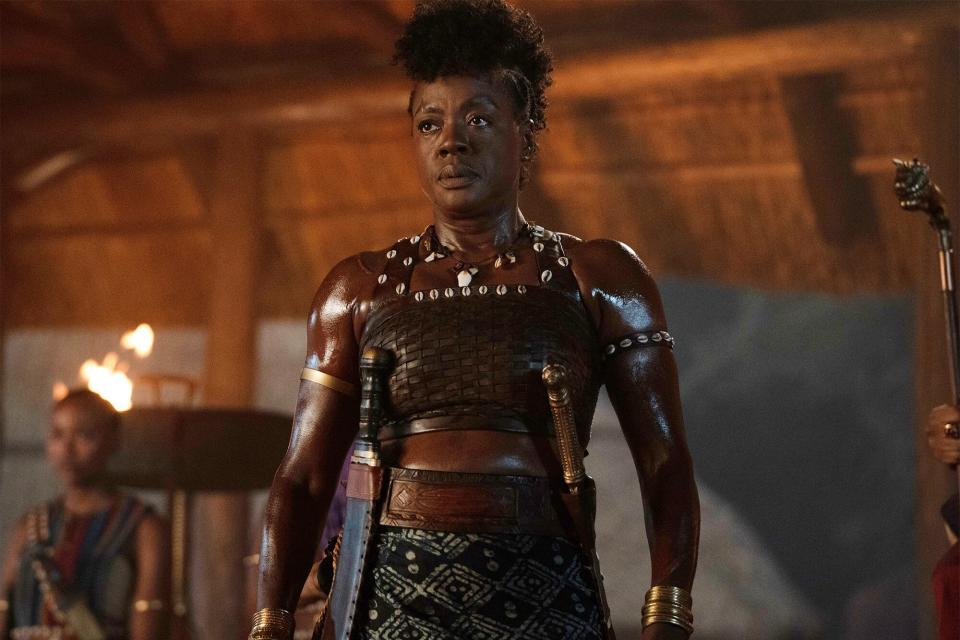
Ilze Kitshoff/TriStar Pictures
Set in the 1820s and scripted by Dana Stevens, The Woman King follows Nanisca as she trains a new generation of warriors to beat back territorial invasion. Davis and her co-stars — including The Underground Railroad's breakthrough lead Thuso Mbedu, MCU and James Bond standout Lashana Lynch, and the striking Ugandan-British actress Sheila Atim — went through intense physical and combat training that bonded them before a single scene was shot.
"I remember the first time we did martial arts training in the gym together," Davis recalls. "I was like, 'Oh, my God, what am I doing at 50-something? You need to sit your ass down.' But that was a huge experience because it was hard. And what made it easier is that we were all in it together and it was hard for all of us."
Getting a historical epic about an unstoppable army of female African warriors to the big screen was, as one can imagine, not the easiest task. The Woman King's journey began in 2015 with the actress Maria Bello, perhaps best known for 2005's A History of Violence. Following a trip to West Africa where she learned about the existence of the Agojie, Bello recruited producer Cathy Schulman.
The pair then pitched the film to Davis on an unlikely occasion, but one to which the Oscar-winner had perhaps grown accustomed: receiving an award. Bello and Schulman took the opportunity at the 2015 Women Making History Awards to convince Davis to make some history with them. And it worked.
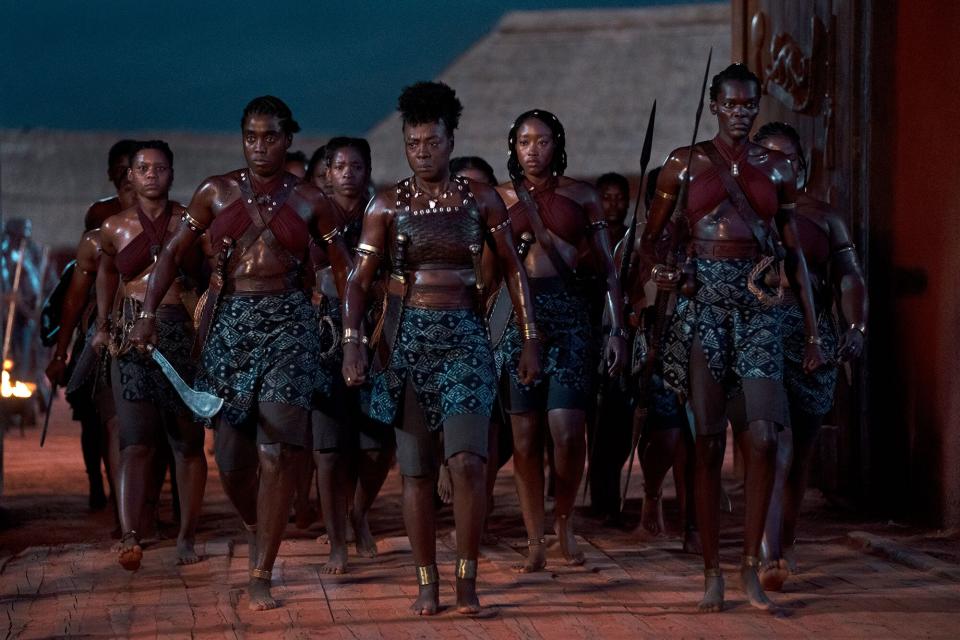
Ilze Kitshoff/TriStar Pictures
"When Maria got up to the podium to present my award, she said, 'I'm going to pitch a movie that I think all of you would love to see Viola Davis in,'" the Woman King star relates. "She went on to tell the story of the Agojie and Dahomey, and they all started cheering. That was my first introduction to the fact that there was a story out there." (Bello shares a story credit with screenwriter Stevens.)
From the first day on set, Davis, her co-stars and director Gina Prince-Bythewood knew they were embarking on something special. The first scene they shot had the Agojie all slowly rising up from the brush, vengeance at hand.
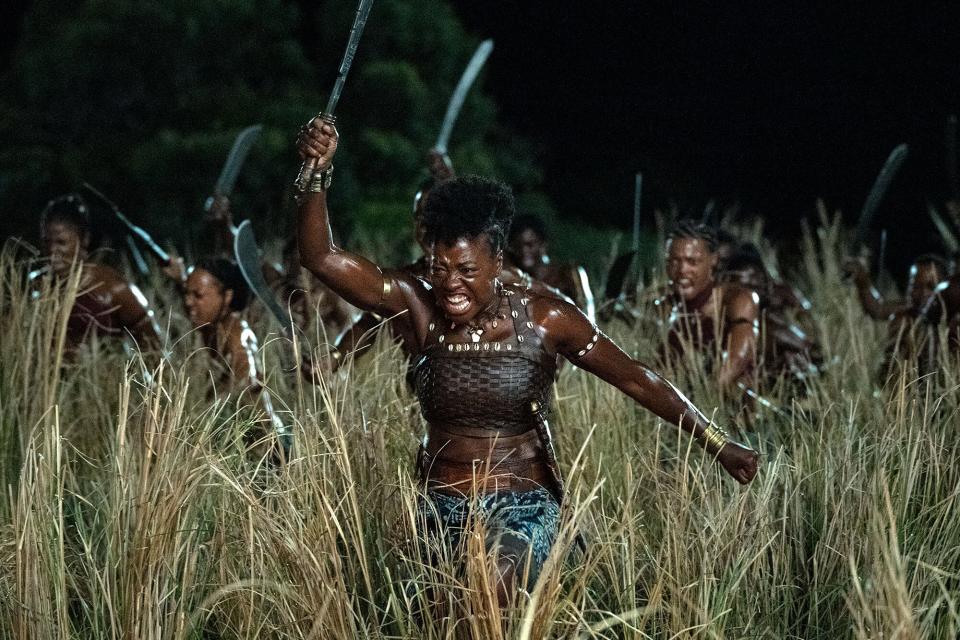
Ilze Kitshoff/TriStar Pictures Viola Davis wages war against European colonialism in 'The Woman King'
"That was a moment right there," Davis says of the scene. "And I remember when we rose up, when we did that first shot, I think Gina had tears in her eyes because I think that was one of the reasons why she signed up for the movie … we've never seen anything like that before."
Besides the physical toll of preparing for The Woman King, Davis, one of the most commanding actresses of her generation, also had her work cut out for her getting into character.
"The thing about it is we wanted it to be authentic," she explains. "And whenever it is authentic, I'm sorry, it's going to cost you something. You're channeling another human being and most of these human beings are in trauma. Look at the scars on all of us, on the characters, on our faces, on our backs. You can imagine where those came from. And Nanisca is a sexual assault survivor. To tap into the spirit of all these human beings, absolutely, you had to do a lot of hardcore work."
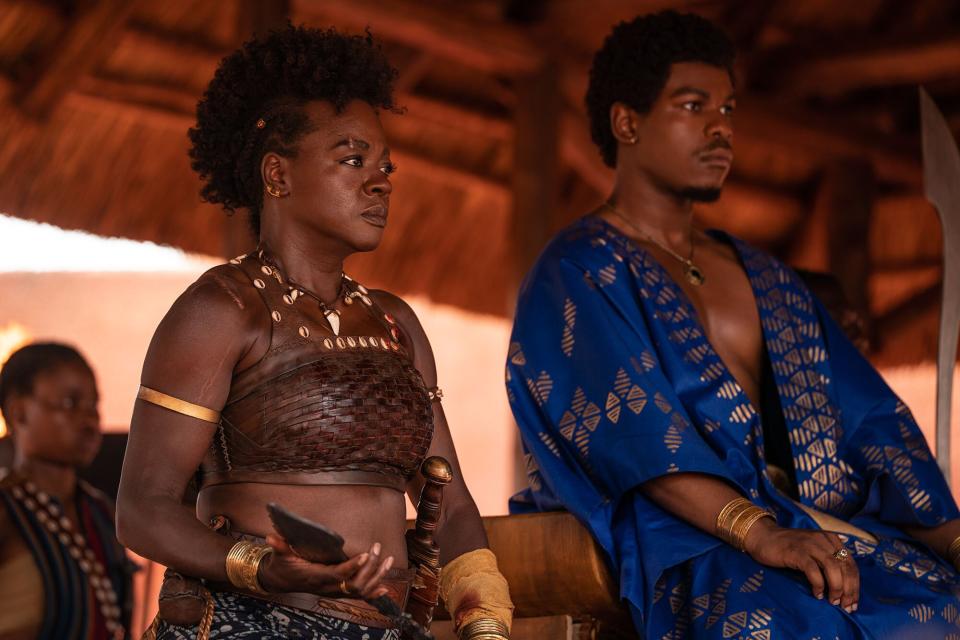
Ilze Kitshoff/TriStar Pictures
When asked the most valuable lesson they learned from making The Woman King, both Davis and co-star Mbedu look back on it as a truly transformative experience. Mbedu learned she has "a voice that matters and can create."
"I think that the dream that is inside of you will need you to fight for it," the South African actress adds. "You cannot afford to wait for the next person to make it happen. The fight will hurt, but it doesn't mean you stop."
For Davis, filming The Woman King taught her that she is a warrior, with or without a weapon in hand.
"I don't need to have a sword to be a warrior — I have the warrior spirit in me," Davis says. "I feel like so much of what you have to fight for as a dark-skinned woman, just living in the world where people just say, 'You're not attractive, you're not valued, you're not any of those things.' And then you get to a point where all those obstacles actually become your fuel and lead to this moment. We're badass."
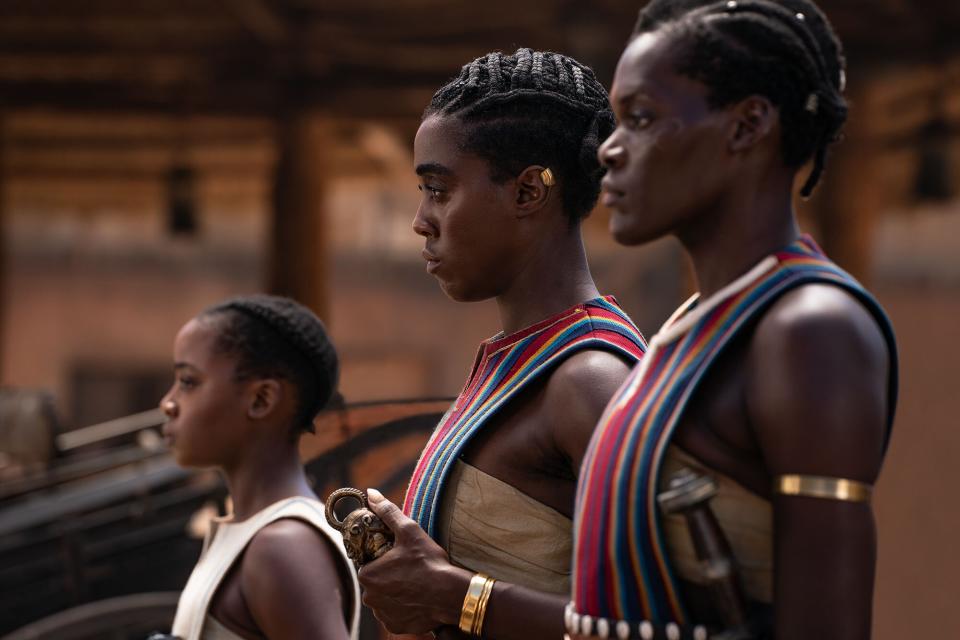
Ilze Kitshoff/TriStar Pictures
And that lesson is universal. Davis not only wants The Woman King to inspire audiences to take risks and "tap into the warrior spirit within themselves," but to serve as an example of what Black women can do when given a chance.
"I always say you got to dare to fail," she says. "Just dare, just throw, because here's the thing: I think reaching for a 10 and hitting a five is better than reaching for a two and hitting a one."
"We can lead the box office," adds Davis. "Black women can be at the center of a narrative and we can lead a global box office and make movies that are meaningful to everybody."
Related content:

